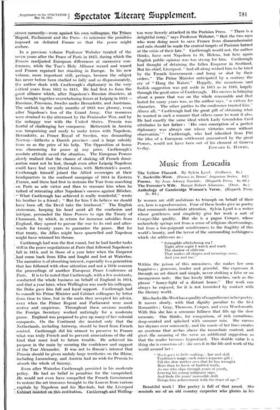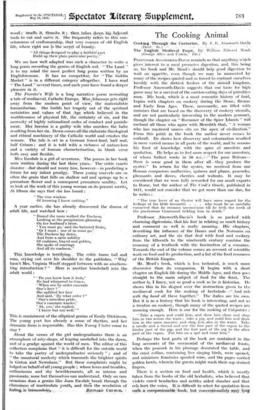Music from Leucadia
:is. 6d.)
IF women are still ambitious to triumph on behalf of their
sex, here is a goodoceasion. Four of these books give us poetry that commands immediate attention. Sylvia Lynd is a writer whose gentleness and simplicity give her work a sort of Cowper-like quality. But she is a pagan Cowper, whose melancholy springs not from a sense of religious shortcomings, but from a too-poignant sensitiveness to the fragility of this world's beauty, and the terror of the surrounding nothingness which she addresses as :
- " Intangible allwhelming sea! - -
Night after night I watch and mark The shadow of oblivion That makes all shapes and meanings none, And you and me."
Within the prison of this uneasiness, she makes her own
happiness ; generous, tender and graceful. She expresses it through an -art direct and simple, never striking a false or an
incongruous note. She has lovely little touches, such as the phrase " honey-light of a distant house." Her work can always be enjoyed, for it is not tarnished by contact with the literary world.
Miss Saekville-West has a quality of magnificence in her poetry. It moves slowly, with that dignity peculiar to the lirit Romantics ; Gray, Thomson, Cowper, and even Wordsworth. With this she has a sensuous fullness that fills up the slow measure. One thinks, for comparison, of rich carnations, deep-scented and splashed with summer rain. She curves her rhymes over sonorously, and the music of her lines creates an overtone that arches above the immediate content, and give's the meaning of the verse ani additional suggestion so that the reader becomes hypnotized. This double value is a thing she is conscious of : she sees it in the life and work of the world around her :
" Much goes to little making,—law and skill Tradition's usage, each man's separate gift Till the slow worker sees that he has wrought More than he knew of builded truth, As one who slips through years of youth, Leaving his young indignant rage, And finds the years' insensible drift Brings him achievement with the truce of age."
Beautiful work ! Her poetry is full of that mood. She :reminds me of an old country Carpenter who glories bilis
wood knells it, thumbs. it; .then_ takes-. flown ,hix_belpved tools to cut and carve it.' She frequently -refers to thiS con- sciousness of craftsmanship, that-very essence of old English life, where right use Is the secret of beauty: "All things designed to play a faithful part Build up their plain particular poetry."
We see how Well adantedWas–sirch a character to write a long poem recording the genius of English soil. " The Land " is to my mind the most perfect long .poem written by an Englishwoman. It has no competitor, for " The Goblin Market " is in a different category altogether. I have read
The Land " several times, and each year have found a deeper pleasure in it.
The Forester's Wife is a long narrative poeM recreating a tale of mediaeval,,Catholic Europe. MissAdamson gets right away from the modem point of view, the materialistic humanitarian. She builds her tragedy out of the spiritual certainties .and, values of that Age_ which believed in the worthlessness of physical. life, the certainty of sin; and the necessity of highly rationalized codes of conduct and punish- ment. ' Her heroine is a guilty wife, who murders the babe resulting from her sin. Down comes all the elaborate theOlogical and ethical machinery of the Catholic world and crushes the woman. The „tale is set in a German forest-land, half real, half Grimm ; and it is told with a richnesS of nature-lore and a variety of human characterization, in blank verse both easy and flexible.
Miss Easdale is a girl of seventeen. The poems in her book were written dining' the laSt. three' years:' Th-. critic courts disaster—that should not worry him, howeverin predicting a future for any infant prodigy. These yoring marvels are so often the grain that falls on shallow soil and springs up to a premature flower and a consequent premature senility. Let us look at the work of this young woman on its present merits, At fifteen she says that she has found :
" The true wisdom Of knowing I knew nothing."
A year earlier, she has already discovered the drama of adult life, and watched hOw
" Round the room walked the Duchess, Looking at the perspiration gleaming On her husband's brow.
' You must go,' said the battered Duke, Or I must ; one of us must go.': The Duchess lay doWn, And froth a satin solidity
Of Cushions, frayed and golden,'
She spoke of marriage And all its madness."
This knowledge is terrifying._ The critic turns tail and
, is . runs, crying out over his shoulder to the publisher, " Why hasn't Mrs. Virginia Woolf stepped between with an ameliora- ting introduction ? " Here is another bombshell into the
adult world : • "
" ' Do you know how it feels,'
He had whispered to Grace, ' When one by order conceals One's love ' She uplifted her face And said, By what order ? '
' One's merciless pride, One's constant warder.'
Ah, yes,' she replied, I know but too well.' "
This is reminiscent-of the elliptical genius of Emily Dickinson. The young poet has already a sense of rhythm, and her dramatic form is impeccable. Has this Young Visiter come to stay ?
About the verses of the girl undergraduates there is an atmosphere of arty-shops, of leaping sandalled into the dawn, and of a grudge against the world of men. The editor of this collection complains that " it is difficult for the outside world to take the poetry of undergraduates seriously " ; and of " the unnatural modesty which trammels the brighter spirits in Girton and Newnham:" But these complaints might be lodged on behalf of all young people ; whose loves and troubles, enthusiasms and shy bewilderments, all so intense and passionate, none but themselves- can understand. Only on rare occasions does a genius like Joan Easdale break through the clumsiness of inarticulate youth, and thell the revelation of



















































 Previous page
Previous page